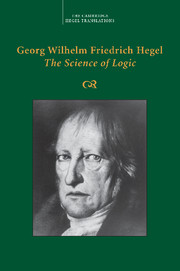Appendix: Hegel’s Logic in its Revised and Unrevised Parts
Published online by Cambridge University Press: 30 September 2021
Summary
It is a matter of speculation how Hegel would have revised Part Two of Volume One (Book Two in the Lasson edition) and Volume Two (Book Three in the Lasson edition) of the Logic if he had lived to complete the planned work of revision. Some clues may, however, be derived from the changes that Hegel brought to the 1817 Encyclopedia Logic in its new edition of 1830. In this last edition, Hegel rearranged the ordering of the categories of “essence.” He replaced the title of the first grouping, which in 1817 was “The Pure Determinacies of Reflection,” with “Essence as the Ground of Existenz”; moved the category of “Existenz,” which in 1817 was in the second grouping under the general heading of “Appearance,” to the first grouping, and replaced it in the second grouping of 1830, still entitled “Appearance,” with “The World of Appearances.” As used by Hegel in all the texts of the Logic that we have, “Existenz” is an ontological term. Like the Scholastic existentia which is the counterpart of essentia, it signifies the being of a thing inasmuch as it is internally grounded by the thing's essence.Within the Logic, Existenz stands reflectively to “essence” as “Dasein” stands immediately to “being.”On the face of it, the 1830 grouping of the categories of essence thus seems to be the more natural one, for it more clearly brings out the close conceptual connection between “essence” and “Existenz.” This connection eventually develops into the idea of an internally cohesive world of variegated appearances, that is, “TheWorld of Appearances” of the 1830 Encyclopedia Logic.One should think, therefore, that a new edition of the “Doctrine of Essence” of the Greater Logic would have followed more closely the headings and groupings of categories of the 1830 Encyclopedia.However, whether these changes would have amounted to a truly substantial conceptual reorientation of the Logic is of course open to question.
Also to be kept in mind is that the Encyclopedia Logic differs from the Greater Logic in sheer size: according to the pagination of the critical edition, there are 168 pages in the 1813 “Doctrine of Essence” as opposed to 30 pages in the equivalent section of the 1830 Encyclopedia. And it also differs in scope.
- Type
- Chapter
- Information
- Georg Wilhelm Friedrich Hegel: The Science of Logic , pp. 754 - 756Publisher: Cambridge University PressPrint publication year: 2010



